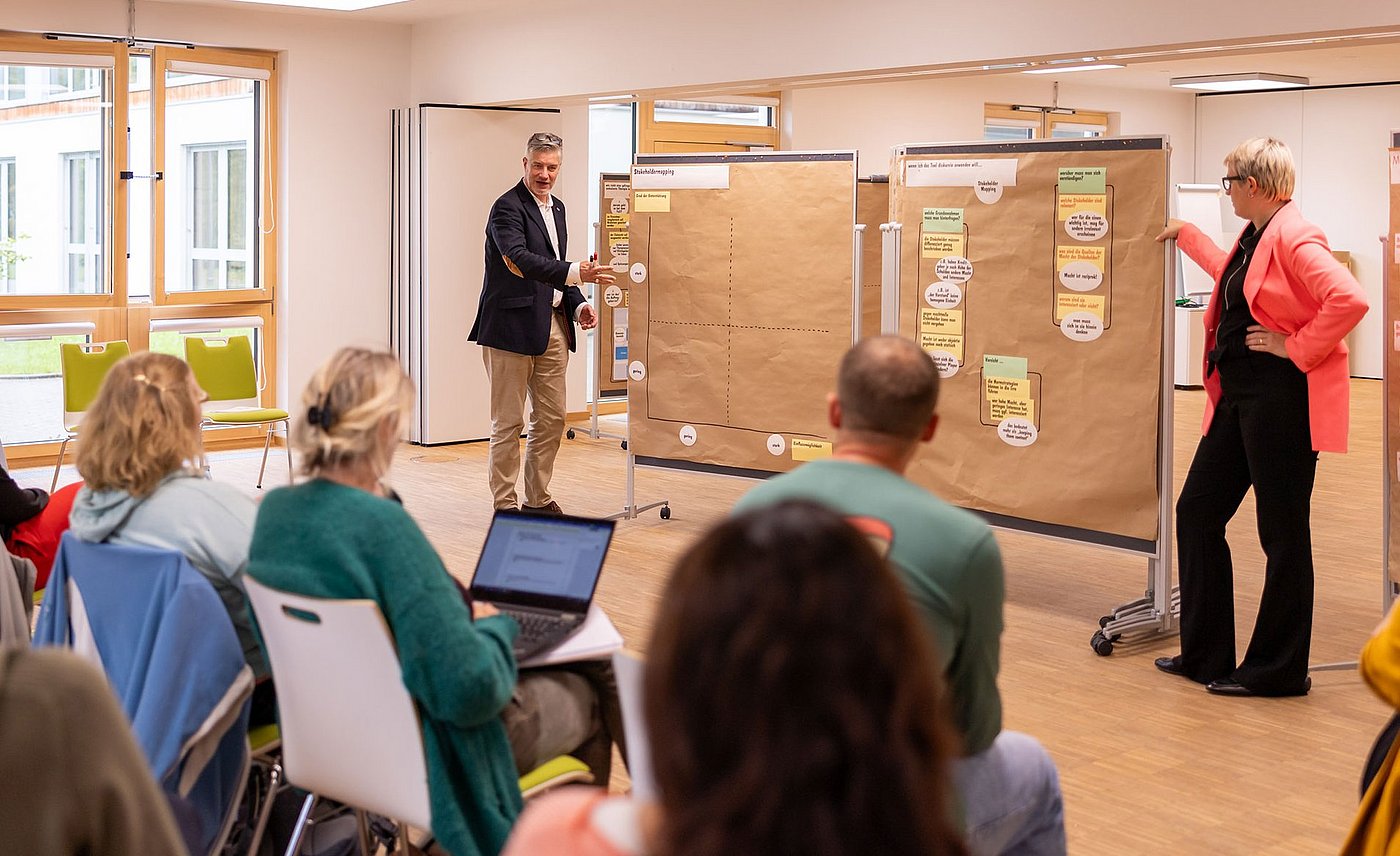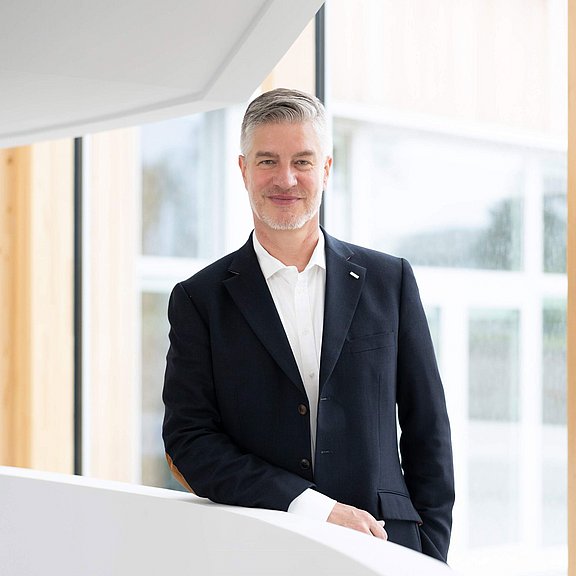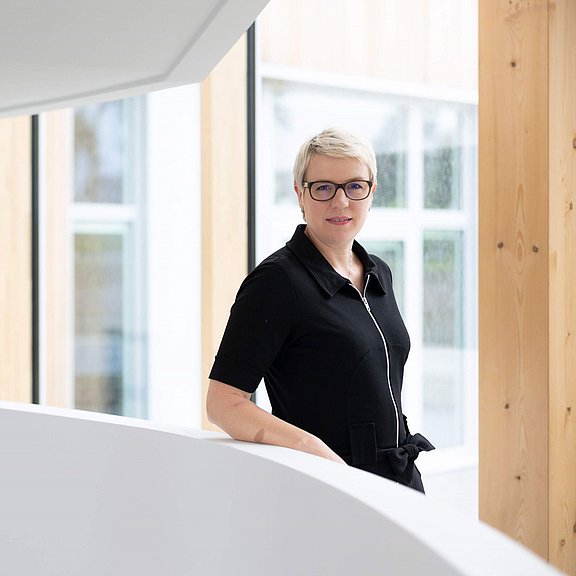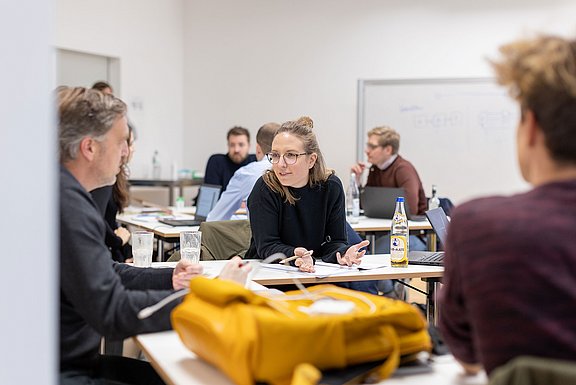Against the grain... How Witten MBA practice partner Metaplan is rethinking organisations and shaping change
Zukunftsmusik: our series of talks with future shapers.

Our colleague Anne Siebelhoff spoke to Bennet van Well and Wiebke Gronemeyer for the "Shaping the future" series about what makes a modern management consultancy and the inevitability of reviewing the functionality of organisational structures and working methods.
Professional Campus: Dear Wiebke, dear Bennet, you are part of the management consultancy Metaplan. As part of the Witten MBA, you are involved in the sessions on agility, innovation and rule-breaking under the heading "Against the grain". What does "against the grain" mean?
Bennet:All of these terms typically have assumptions associated with them, which are sometimes socially romantic or moralising, but above all fixed on solutions. In our "Against the grain" programme, we question the typical understanding of these terms and thus open up new possibilities for action.
Wiebke:And sometimes this methodology also goes against the grain of management trends and fashions. Because we bring in a perspective in which we look at the dynamics in organisations and ask about their functionality. These can be things that are questionable at first glance, such as breaking rules, but are highly functional for the organisation.
Professional Campus:I would like to pick up on your methodology. You rely on an interdisciplinary team from different disciplines and age groups in order to have a broad spectrum of experience and perspectives. What is the concept for success behind this and how can this diversity help?
Bennet:We use different organisational science and social science perspectives to approach the consulting and observation subject of "organisation". Our impact is enhanced by the fact that we ourselves look at the organisations from a wide variety of backgrounds and perspectives, develop strategies and approach the interests of stakeholders in the organisations. Diversity of perspective helps us to avoid falling into answers too quickly. From the very beginning, Metaplan has been characterised by the fact that we take a close look: What are good reasons for actors in organisations to act in their own way? In this way, we develop new approaches for breaking up deadlocked situations and creating orientation.
Wiebke:Working in discourse and the constant joint struggle for the right approach to organisational processes defines our work. We do this internally, but also together with our customers. Thanks to our clear approach, we can also have our own personal perspective on things and our diversity means that we don't have to qualify ourselves in certain sectors first.
Professional Campus:With your "Strategy & Organisation" module in the Witten MBA, you are working precisely at this interface. What makes this module different from a traditional Management course?
Bennet:The fact that we work directly with the participants' case studies means that our tools, perspectives and ideas are also focussed on the cases. We don't work with casebook studies in which the candidates have to follow a perfect path, but with the people in the organisation and their concerns themselves. In addition, we are first interested in understanding how organisations actually are, rather than normatively saying how they should be. We start from micro-political systems in which actors have intentions and interests, and we then make these the starting point for organisational work and strategy development.
Wiebke:As practice partners in the Witten MBA, we definitely produce disappointment at first. In principle, we turn the tables: "Strategy & Organisation" becomes "Organisation & Strategy". This is because we first want to understand what the respective organisation is before we think about the strategy. We don't just feed the participants a bunch of mnemonics, but challenge them to think for themselves: How do I manage to introduce and advance strategy and organisational design in my organisation?
Bennet:And we don't proclaim any truths, but our didactic concept invites people to doubt and question. In everything we develop and present to students, we ask: What are your doubts? Why do you think this can't work? What do you dislike about what we present to you? What haven't we thought of? What are you missing?
Professional Campus: You focus a lot on "agility" in particular. How would you describe an agile way of working and why is it so important?
Bennet:Günther Ortmann describes agility as a floating signifier. The term "agility" is a term that can be used in different ways and initially refers to challenges in organisations that are primarily bureaucratic. There is now a management fashion that is supposed to provide answers to all questions, and it is called "agility". All kinds of methods, trends and perspectives are hidden behind this term. But when agility is propagated, you should first realise what the problem is: What is the problem I want to solve? Is it therefore just a matter of serving the appearance, or is it really about solving a specific problem between a number of functions, departments and areas? In today's world, agility is a legitimate label that can be used to get through the door to address things that were not discussable or addressable.
Wiebke:One problem is equating agility with an agile way of working. First of all, agile is just a description of a state, which means that you either want to change this state or believe that you have already achieved it. So before you face up to concrete changes or structures, you first have to ask yourself: Where are you right now and what do you think you are changing when you use this empty signifier? And this is exactly what goes against the grain in classic management discourses.

Dr Bennet van Well
Metaplan

Dr Wiebke Gronemeyer
Metaplan
Professional Campus: In the 1990s, the trend of "humanising the organisation" increased. Even back then, the question of how to organise working conditions and work culture correctly was already high on the agenda. What is a contemporary answer to the question of how organisations can be humanised?
Wiebke:I don't know if the view has changed. What has changed is the demand on organisations to be more humane. Work-life balance arguments or the purpose movement are trying to put people and attributes of the individual at the centre. Conversely, however, it must be recognised that many of the consequences derived from this prove exactly the opposite. Flexibilisation of working hours, for example, leads to a dissolution of the boundaries of working hours. If parents are offered the opportunity to work from 7 a.m. to 2 p.m. in order to look after their children in the afternoon, they are more likely to catch up late in the evening on what they think they have missed in the afternoon. In addition, the claim to put people at the centre actually leads to a capitalisation of the individual for the organisation. The way forward should therefore be to address the circumstances of the organisation and change something about them.
Bennet:The book "Die Humanisierung der Organisation" (Matthiesen, Muster, Laudenbach 2022) is actually a plea against the encroachment of the employer organisation on people. The colonisation of the private sphere by the organisation must be pushed back and it must be recognised that people contribute manpower, but do not have to contribute themselves in their entirety. This is a claim that is misguided and against which we can and must defend ourselves.
Professional Campus: How do we manage to be open to lifelong learning processes?
Bennet:Consulting work is characterised by the fact that we constantly encounter new topics, organisations and constellations and have to deal with them in new and different ways, because the world continues to evolve. The very fact that we as consultants are out and about in organisations and work with organisations challenges us to constantly take a fresh look and learn anew in order to find answers together with our clients. Our academy is also characterised by the fact that our consultants are always confronted with the same issues that the participants are confronted with. This allows them to learn things from their own experience, which is also a good step towards lifelong learning.
Wiebke:In very concrete terms, lifelong learning processes require two things. Firstly, you have to be able and allowed to question things. This is not only relevant in an academic context, but also for companies. So there must be a willingness at the highest level to question assumptions that you may have made yourself or to have them questioned by other parts of the organisation. But you also have to be able to listen and create arenas in which it is even possible to discuss strategy and the market, for example.
Professional Campus: I would like to engage with you further on the topic of leadership. How do we lead today and what are important factors for good leadership?
Bennet:We have a concept of leadership that is moving away from a heroic understanding of leadership, where leadership is seen as something very special. Instead of focusing on the individual, we address the tension between the organisation and those responsible for leadership. Leadership does not mean always giving answers first. Leadership can be seen more as an interaction or an exceptional circumstance, where we say: Before critical moments constantly arise in organisations where someone has to take the lead or make delicate decisions, structures should be created to provide orientation and clarity. There are still enough difficult issues that require leadership. You can also go against the grain with this assumption.
Professional Campus: Conversely, can it be said that hierarchically structured organisations are more sluggish?
Wiebke:Our understanding of leadership does not go against lived organisational practice, nor does it mean that hierarchy is bad. On the contrary; there are good reasons to say that hierarchy works. But hierarchy and leadership are not the same thing. We tend to focus on the case where there is too much leadership in organisations, i.e. too much acting in fire-fighting mode. We then look at what structures can be created so that leadership remains an exception because there is orientation and clear framework conditions.
Professional Campus: In the Witten MBA, you work a lot with case studies from the students' practical experience. What core topics do you cover there?
Wiebke:Many of the students work in organisations where they are involved in innovation topics or strategy development. Beyond the question of how something like this works, another big issue is that innovations ultimately have to gain a foothold in organisations. So you have to be careful not to innovate past the organisation. This involves a lot of micro-politics and the question of which interests need to be taken into account in order to be compatible within the organisation and make progress in your own work.
Professional Campus: What does shaping the future mean to you, especially with regard to strategic organisational development?
Bennet: For strategic organisational development and shaping the future, you need someone in an organisation who wants something, because nothing usually happens on its own at first. It is then necessary to conduct joint discourse in such a way that stakeholders are brought behind the idea. I advocate the courage to engage in debate, the courage to engage in discourse and the courage to contradict in order to move things forward and make a difference instead of imposing compliance.
Wiebke: Discourse is precisely there to find out how far you can go and within what limits you can move. It's also particularly about the design aspect. And shaping means driving things forward and accepting that you might burn your fingers in the process.

Witten MBA - Leadership & Management
Do you want to take on more responsibility in a team, in a company or in society? Then the part-time Witten MBA is the right programme for you!